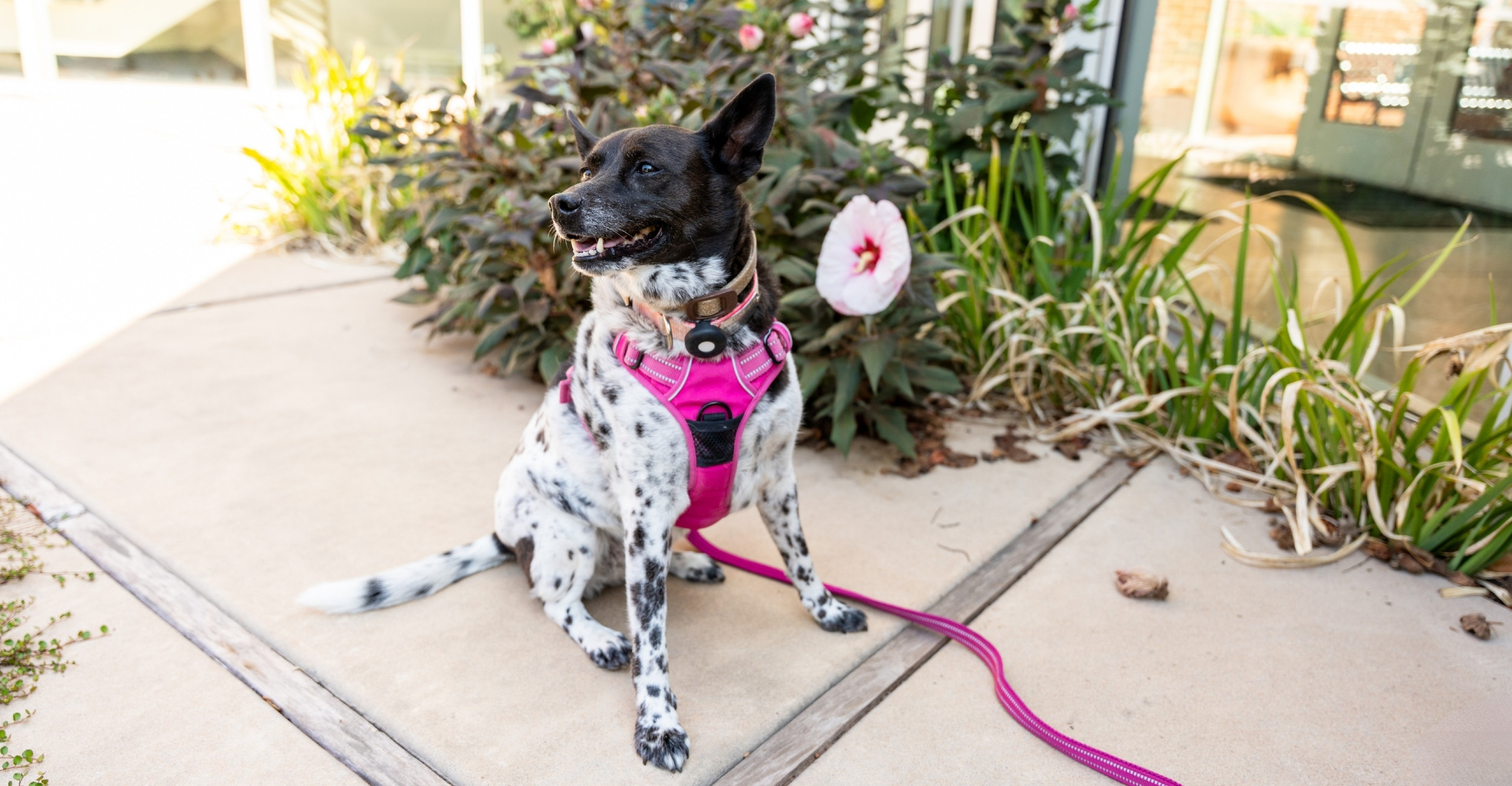
From Stress to Serenity: OSU expertise helps Lucy the dog thrive again
Thursday, October 9, 2025
Media Contact: Bailey Horn | Marketing Specialist | 405-744-6728 | bailey.horn@okstate.edu
Through the Oklahoma State University Veterinary Medical Teaching Hospital behavior medicine service, Dr. Courtney Bir and her 12-year old dog, Lucy, found the tools and support they needed to improve Lucy’s quality of life.
An OSU animal science undergraduate, Bir worked for an independent animal pharmaceutical testing company for a year following graduation. With a dream of becoming a veterinarian, she pursued veterinary school for a semester before making the decision to return to OSU to gain an additional bachelor’s degree in agricultural economics.
Recognizing her passion for the business and economic side of agriculture, Bir obtained a master’s degree in agricultural economics. Seeking a companion for their Maltese dog named Donut during her graduate school journey, Bir and her husband, Ben, adopted Lucy from Stillwater Animal Welfare.
The high energy pup has always been an integral part of the couple’s journey. Lucy followed Bir to Purdue University to pursue her Ph.D. and back to Oklahoma when the door opened to come back to OSU.
As an associate professor of agricultural economics in the Ferguson College of Agriculture, Bir spends her career analyzing business problems and helping veterinarians develop management strategies.
Despite her partnership working with veterinarians and many clinical professors at the OSU College of Veterinary Medicine, it was not until the Bir’s attended the Research on Tap event at Iron Monk Brewing Company that she discovered the missing piece for Lucy. That missing piece was Dr. Leticia Fanucchi, clinical assistant professor in behavior medicine, who happened to be presenting a community lecture on dog behavior.
Even though Bir’s expertise is in farm management, not animal behavior, she developed interest in behavioral characteristics as she navigated the challenges of handling a high-stress pet.
“I have a personal interest in dog training and I had read a lot and worked in a clinic, so I felt like I was pretty well equipped to handle a high energy dog,” Bir said. “At first, when Lucy was younger, I felt like it was general anxiety.”
However, as Lucy grew, so did her nerves and anxiousness. Recognizing this, Bir and her husband sought out dog trainers and approached their local veterinarian to get her some help.
“When we moved back to Oklahoma, Lucy lost her long-term companion,” Bir said. “The little Maltese dog that she had always had in her life passed away at a very old age and she had a lot more stress in her life.”
Implementing medications from their primary veterinarian, the stress plateaued for a little while. Then, Lucy had a couple of seizures, which only made the stress worse.
“It got to the point where she was terrified of the vacuum,” Bir said. “I couldn’t use it without her trying to run through the glass door.”
With two other dogs and three cats in the house, vacuuming frequently was a necessity and this became a serious issue for Bir. Feeling as if Lucy’s needs had become too severe for her or the veterinarian to help control, Bir was desperate for answers and assistance.
After listening to Fanucchi’s lecture at Research on Tap, it was clear she was the exact resource Lucy needed.
“Despite me being at the veterinary teaching hospital all the time, I just didn’t think about it,” Bir said.
Fanucchi was quick to get Lucy in for an appointment and the Bir’s saw significant results. After identifying Lucy’s behavioral status and current medication intake, Fanucchi made adjustments to her dosage requirements.
“It’s a combination of behavioral changes and routine adjustments,” Bir said. “She goes on a walk each day, gets her sniff time, and pairing this with the medication has helped her be herself again.”
Fanucchi and her team recommended a pheromone collar that is designed to help calm dogs during stressful situations such as thunderstorms, fireworks, separation, travel or veterinary visits. The collars release synthetic pheromones that mimic natural calming signals to help reduce anxiety.
“The results from the dog collar have been remarkable,” Bir said. “Our veterinarian actually carries these collars now because they’ve noticed such a change in the success of Lucy.”
Another technology that has proven to be beneficial for Lucy are her custom, rechargeable headphones. The noise cancelling equipment helps Lucy during times of stress, storms or in loud environments.
This past summer, Bir was apprehensive about leaving Lucy at home for the Fourth of July while she and her husband traveled out of town.
“Our house sitter is also a veterinary student, so I felt confident leaving Lucy with her, but I was nervous about how she would react to the fireworks,” Bir said. “To my surprise, Lucy was perfectly fine and did not even have to wear her headphones, largely due to the help of Dr. Fanucchi.”
Lucy’s improvement is leaps and bounds from where she once was, Bir said. Today, Bir communicates with Fanucchi digitally and Lucy only sees her for an annual checkup.
When asked what advice she would give to someone with a pet in a similar situation as Lucy, Bir replied:
“I think starting with your primary care veterinarian is important. Get their opinion, seek outside resources and experts if needed, and be willing to make small daily adjustments that will make a big difference for your pet.”
Story By: Presley Pullen | ppullen@okstate.edu
